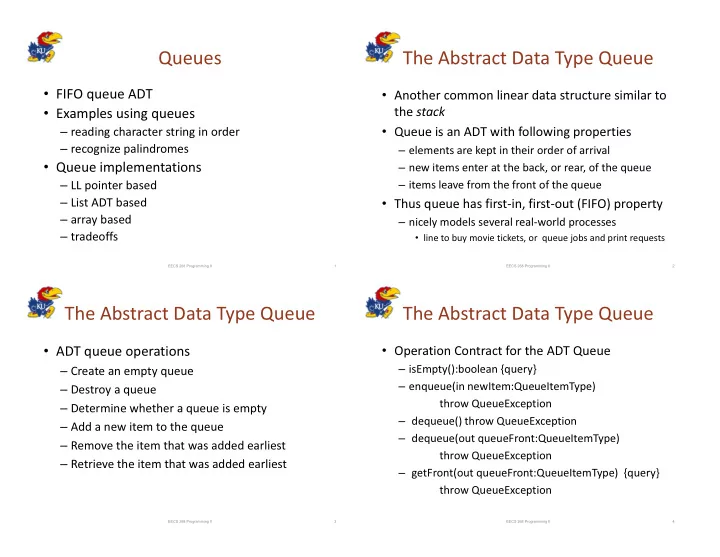

Queues The Abstract Data Type Queue � FIFO queue ADT � Another common linear data structure similar to the stack � Examples using queues � reading character string in order � Queue is an ADT with following properties � recognize palindromes � elements are kept in their order of arrival � Queue implementations � new items enter at the back, or rear, of the queue � items leave from the front of the queue � LL pointer based � List ADT based � Thus queue has first-in, first-out (FIFO) property � array based � nicely models several real-world processes � tradeoffs � line to buy movie tickets, or queue jobs and print requests EECS 268 Programming II 1 EECS 268 Programming II 2 The Abstract Data Type Queue The Abstract Data Type Queue � ADT queue operations � Operation Contract for the ADT Queue � isEmpty():boolean {query} � Create an empty queue � enqueue(in newItem:QueueItemType) � Destroy a queue throw QueueException � Determine whether a queue is empty � dequeue() throw QueueException � Add a new item to the queue � dequeue(out queueFront:QueueItemType) � Remove the item that was added earliest throw QueueException � Retrieve the item that was added earliest � getFront(out queueFront:QueueItemType) {query} throw QueueException EECS 268 Programming II 3 EECS 268 Programming II 4
The Abstract Data Type Queue Example 1: Ordering Character String � A queue can retain characters in the order in which they are typed aQueue.createQueue() while (not end of line) { Read a new character ch aQueue.enqueue(ch) } // end while � Once the characters are in a queue, the Figure 7-2 Some queue operations system can process them as necessary EECS 268 Programming II 5 EECS 268 Programming II 6 Example2: Recognizing Palindromes Example2: Recognizing Palindromes � A nonrecursive � A palindrome is a string of characters that recognition algorithm for reads the same backwards and forwards palindromes � RADAR, MADAM, EYE, etc. � traverse character string � Observations from left to right � stack reverses the order of occurrences � insert each character into both a queue and a stack � queue preserves the order of occurrences � compare the characters at � A palindrome stored in both stack and queue the front of the queue and will display a match when retrieved the top of the stack EECS 268 Programming II 7 EECS 268 Programming II see C7-palin.cpp 8
Linked List Implementations Implementations of the ADT Queue � Linked list based queue implementation � can maintain pointers to front and back of Queue � circular linked list with one external reference also possible � Using ADT List class to implement queue � possible less efficient, but simple � An array-based queue implementation � problem of rightward-drift Figure 7-4 A pointer-based implementation of a queue: (a) a linear linked list with two external pointers; (b) a circular linear linked list with one external pointer EECS 268 Programming II 9 EECS 268 Programming II 10 Operations in LL Implementation List Based Queue Implementation Figure 7-5 Inserting � Queue operations map well to ADT List an item into a operations nonempty queue � enqueue(item) � insert(getLength()+1, item) � dequeue() � remove(1) Figure 7-6 Inserting an � getFront(qfront) � retrieve(1, qfront) item into an empty queue: � We can built the queue ADT as a wrapper over (a) before insertion; (b) after insertion the List ADT Figure 7-7 Deleting an item from a queue of more than one item see C7-QueueP.cpp see C7-QueueL.cpp 11 EECS 268 Programming II 12
� � An Array-Based Implementation Circular Array Implementation � Using arrays is slightly more complex � Problem: � naïve implementation causes rightward drift � front == (back+1) is � queue appears full even when array does not hold true for both queue MAX_QUEUE-1 elements full & empty � Solutions to rightward drift � always copy array elements to left � expensive � Solution: � maintain circular array � how to detect queue full/empty? � use integer counter to hold size of queue � update on each enqueue/dequeue EECS 268 Programming II 13 EECS 268 Programming II 14 An Array-Based Implementation Array Implementation Variations � Initialize the queue, Use a flag isFull to distinguish front = 0, back = MAX_QUEUE � 1, between the full and count = 0 empty conditions � Inserting into a queue Declare back = (back+1) % MAX_QUEUE; MAX_QUEUE + 1 items[back] = newItem; locations for the ++count; array items, but use � Deleting from a queue only MAX_QUEUE of front = (front+1) % MAX_QUEUE; them for queue --count; items see C7-QueueA.cpp EECS 268 Programming II 15 EECS 268 Programming II 16
Comparing Implementations A Summary of Position-Oriented ADTs � Static arrays Vs. dynamically allocated LLs � Position-oriented ADTs � enqueue operation cannot add item if array is full � List � no size restriction with LL (unless memory full) � Stack � Queue � LL Vs List bases array implementations � Stacks and queues � LL-based implementation is more efficient � ADT list approach reuses already implemented � Only the end positions can be accessed class � Lists � much simpler to write � All positions can be accessed � saves programming time EECS 268 Programming II 17 EECS 268 Programming II 18 Summary A Summary of Position-Oriented ADTs � ADT queue has first-in, first-out (FIFO) behavior � Stacks and queues are very similar � Circular array eliminates the problem of � Operations of stacks and queues can be paired off rightward drift in array-based implementation � createStack and createQueue � To distinguish between the queue-full and queue- � Stack isEmpty and queue isEmpty empty conditions in a circular array � push and enqueue � count the number of items in the queue � pop and dequeue � use an isFull flag � Stack getTop and queue getFront � leave one array location empty � LL and List ADT based implementations possible EECS 268 Programming II 19 EECS 268 Programming II 20
Recommend
More recommend